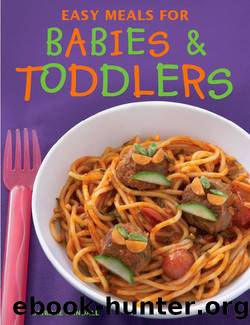Easy Meals for Babies & Toddlers by Deirdre Randall

Author:Deirdre Randall
Language: eng
Format: epub
ISBN: 9781432300562
Publisher: Penguin Random House South Africa
Published: 2011-12-31T16:00:00+00:00
MYTHS ABOUT FOOD AND NUTRITION
* * *
Feeding your baby or toddler requires both knowledge and common sense. It is advisable to read as much as possible about the nutritional requirements of babies and toddlers, but ultimately you cannot apply hard and fast rules to children, and you may make yourself and your toddler miserable trying to do so. It is better to apply your own common sense, and to look for the reason behind a particular âruleâ or assumption.
In the end, you need to do what benefits your child and suits you â even if this means changing some of your habits, assumptions, attitudes or priorities. The following are common myths surrounding food and nutrition:
âA nourishing meal is always a cooked oneâ
Having one cooked meal each day is a habit. A working parent may be exhausting herself trying to cook a meal each night while giving a child or children adequate attention at the same time. Your children will remember you for the time and love you give them, not the cooked meals. It may be better to have open sandwiches, fruit, soup, or âpicnicâ suppers which require little preparation time and leave you free to spend more time with your children. Fruit and vegetables are in fact more nutritious raw than cooked, as cooking destroys vitamin C.
âA child must eat vegetables to be healthyâ
Many children are perfectly healthy on seemingly unbalanced diets. They thrive, despite refusing to eat vegetables, milk, or cheese. A balanced diet is one which provides the essential nutrients in the required quantities; it does not necessarily consist of meat and two vegetables, followed by something sweet.
âEveryone needs three meals a dayâ
Children, like adults, have different metabolisms and therefore different requirements as far as food is concerned. Some people are perfectly happy with three reasonable meals a day, with light snacks in between, while others need less food more frequently. It is only because of convention â not necessarily for nutritional reasons â that certain foods are served at certain times of the day or in a certain sequence in a meal. There is no reason at all why a toddler should not have porridge or muesli for lunch or supper, or a salad for breakfast, if this is what she wants to eat.
âHealth foods are healthierâ
Much mystique and an enormous industry have arisen around âhealthâ foods, for example health bars, health drinks and health cereals. While more roughage and less sugar are certainly to be encouraged in a diet, it is not necessary to buy special foods to cater for this. Honey is not âhealthierâ than refined sugar, nor is yoghurt any âhealthierâ than other dairy products although probiotic âlive culturesâ definitely are healthy. What matters in the end is the total amount of sugar, roughage or protein that a child eats in a day. There is little point in giving a child a cereal with no added sugar if he is then given âhealthâ syrup which usually has a high sugar content.
Download
This site does not store any files on its server. We only index and link to content provided by other sites. Please contact the content providers to delete copyright contents if any and email us, we'll remove relevant links or contents immediately.
A Court of Wings and Ruin by Sarah J. Maas(7789)
The Death of the Heart by Elizabeth Bowen(3596)
The Sprouting Book by Ann Wigmore(3575)
Better Homes and Gardens New Cookbook by Better Homes & Gardens(3569)
BraveTart by Stella Parks(3433)
Salt, Fat, Acid, Heat: Mastering the Elements of Good Cooking by Nosrat Samin(3132)
Sauces by James Peterson(3084)
Kitchen confidential by Anthony Bourdain(3070)
The Bread Bible by Rose Levy Beranbaum(3055)
Classic by Mary Berry(3000)
Solo Food by Janneke Vreugdenhil(2959)
Ottolenghi - The Cookbook by Yotam Ottolenghi(2919)
Martha Stewart's Baking Handbook by Martha Stewart(2845)
Day by Elie Wiesel(2770)
Betty Crocker's Good and Easy Cook Book by Betty Crocker(2705)
My Pantry by Alice Waters(2599)
The Plant Paradox by Dr. Steven R. Gundry M.D(2596)
The Kitchen Counter Cooking School by Kathleen Flinn(2506)
Hot Sauce Nation by Denver Nicks(2478)
